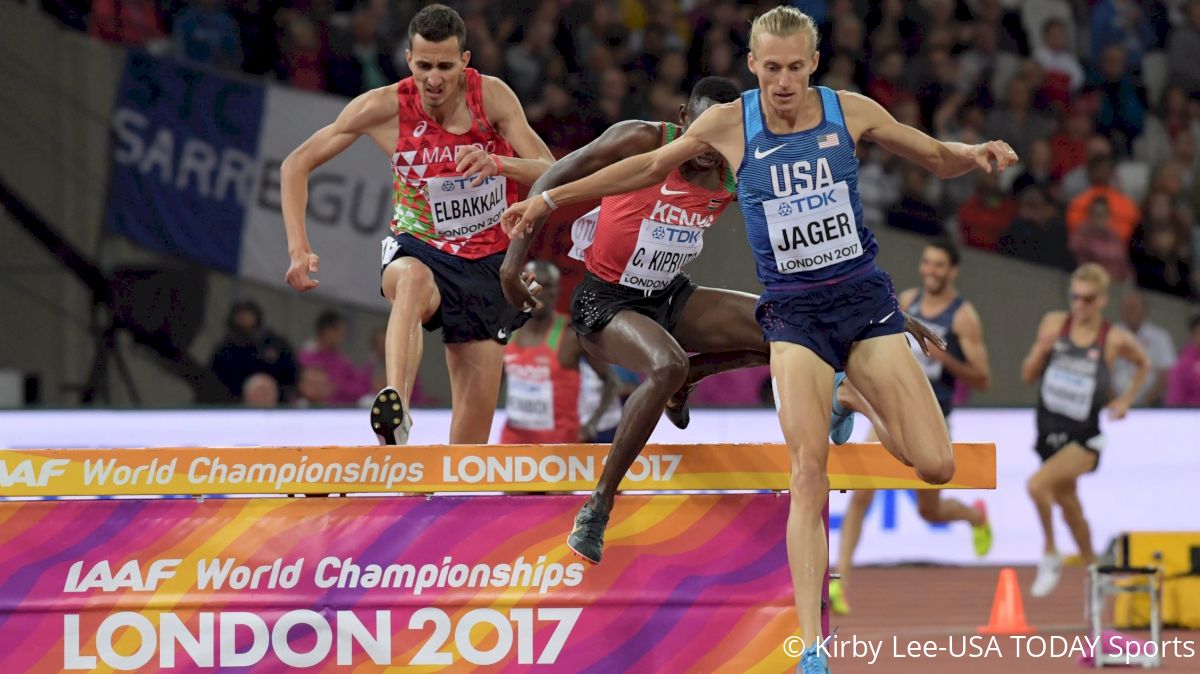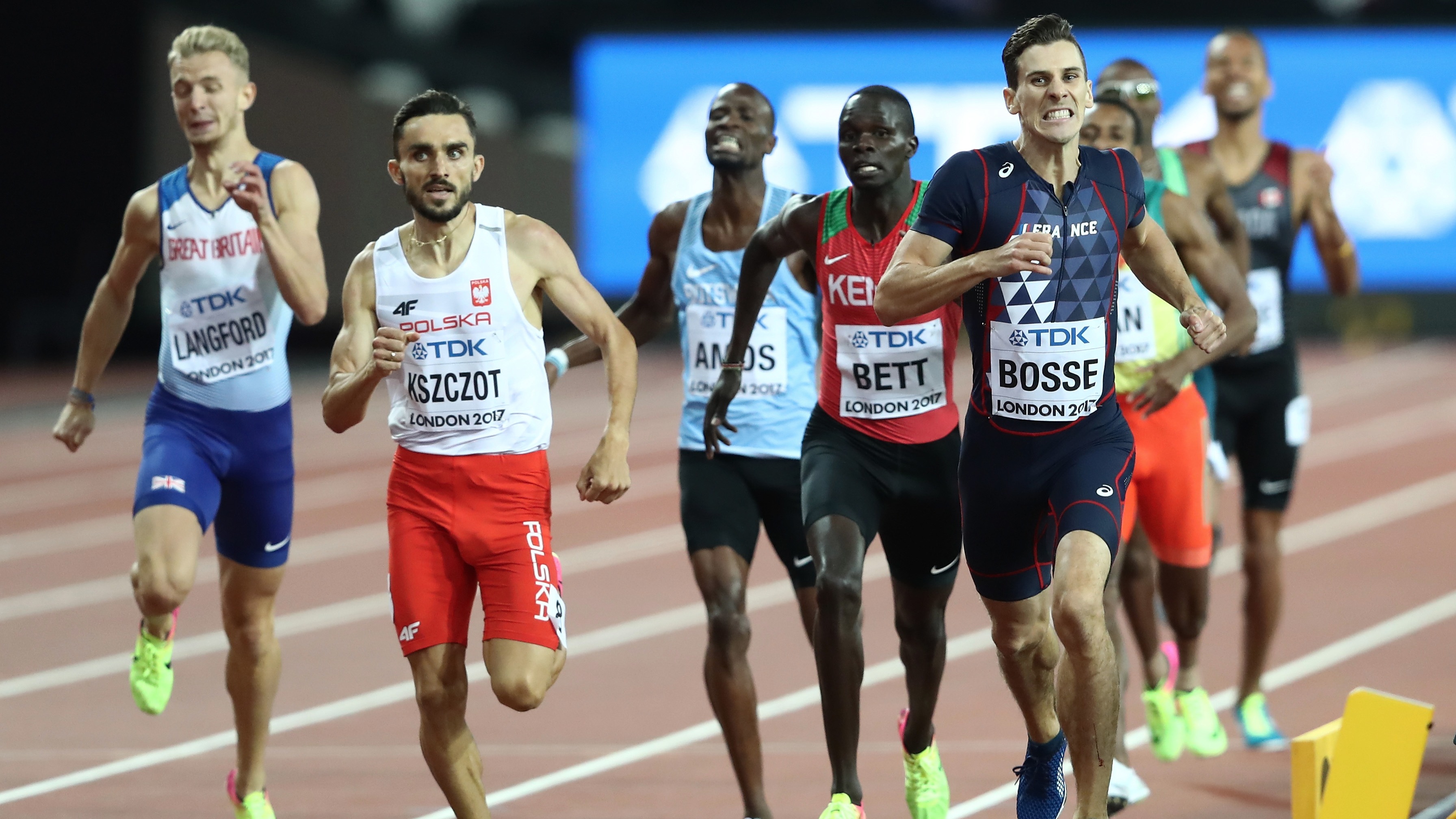2017 IAAF World ChampionshipsAug 9, 2017 by David Monti
Bronze Medalist Evan Jager "Just Wanted To Make It Hard" In Steeple Final
Bronze Medalist Evan Jager "Just Wanted To Make It Hard" In Steeple Final
Recap with quotes from Day 5 of the 2017 IAAF World Championships, which saw Evan Jager win the United States' first-ever steeple medal and Frenchman Pierre-Ambroise Bosse unleash an unmatchable kick to win the 800m.

By David Monti, @d9monti
(c) 2017 Race Results Weekly, used with subscription
LONDON (08-Aug) -- Coming into the 16th IAAF World Championships here at London Stadium, Kenya's Conseslus Kipruto was worried. The 2016 Rio Olympic steeplechase champion was nursing an injured right ankle and hadn't finished a race since June 24th when he won the Kenyan Trials in Nairobi.
But the 22 year-old athlete won his preliminary heat here in a solid 8:23.80, and coming into tonight's final he told himself that no matter what, he was still the Olympic champion, still the man to beat.
"I used my plans well, and last night for morale I told myself, 'I am Olympic champion and that others must break me," he told IAAF interviewers.
Kipruto kept his plan simple. He would shadow the tall American Evan Jager, a man he knows well and the rival he respected most, and move when the time was right. He had to be patient.
"There are others who are strong but I used my own plans," he said. "I knew if the race was around 8:10 that I was going to win."
The opening pace was slow, just 2:51.81 for the first 1000 meters. Jager, who ran a world-leading 8:01.29 in Monaco last month, knew that he had to pick things up. He didn't want the race to come down to a mass sprint.
"I thought it was going to go a little slow for the first K," Jager told reporters. "If that happened, we thought it was best, for me, to try to get rid of guys by going hard from three or four laps to go. Basically, you make it a strength race by going a little bit further out."
At the water jump just before four laps to go, Jager gamely bounded to the lead, shadowed by Kipruto and his two Kenyan teammates, four-time world champion Ezekiel Kemboi and Jairus Birech. Morocco's Soufiane Elbakkali also stayed with the leaders. For three more laps, Jager led the way, shedding everyone but Kipruto, Elbakkali and Kemboi by the bell. Kemboi would soon fall off the pace, too.
"I just wanted to make it hard," Jager explained. "It's tough, it's hard to run over half the race from the lead."
Going down the backstretch, Kipruto leaped to the lead with one lethal move. Both Jager and Elbakkali gave chase, but Kipruto continued to pull away, taking the final water jump first and having plenty of daylight on his challengers in the final 120 meters. Looking at the crowd, beating his fist against his racing uniform, and finally punching the air, he crossed the line in 8:14.12 with his first world title. He had been second at these championships in both 2013 in Moscow and 2015 in Beijing.
"I'm happy to be world champion," he declared. "Last year I became Olympic champion and this year to be world champion was my hope."
Elbakkali went past Jager before the final water jump and was a clear second in 8:14.49. Jager had to hustle in the final 30 meters to stay ahead of a hard-charging Mahiedine Mekhissi of France, but the American was able to claim bronze in 8:15.53 to the Frenchman's 8:15.80.
"I peaked up at the big screen just to be safe," Jager recalled when asked about when he realized that his bronze medal might be in jeopardy. He continued: "I looked back and I was like, oh my gosh, I hope I have enough left. He always has a big last kick."
Kemboi, 35, who will likely retire after tonight's race, faded to 11th in 8:29.38. Jager's USA teammate, Stanley Kebenei, finished fifth in 8:21.09 in his first IAAF World Championships.

BOSSE IS BEST IN 800M
In the men's 800m final, France's Pierre-Ambroise Bosse ran a savvy race to collect his first world title in 1:44.67. Bosse, 25, made a single and decisive move coming down the back stretch after following the smooth and honest pace set by Canada's Brandon McBride (50.78 at the 400-meter mark). He was never challenged, giving France their first gold medal of these championships.
"Trust me, I live my dream. Or am I dreaming?" Bosse told IAAF interviewers. "Thanks to the crowd for the support. I still can't believe it."
Poland's Adam Kszczot showed the most strength in the final 100 meters, moving from fifth position coming out of the final bend to second at the line. Crossing in 1:44.95, he earned his second consecutive silver medal at these championships.
"I was really confident," Kszczot told Race Results Weekly of his final kick. "I saw what's happening in front of me. I knew that first 300 was crazy fast. In such a moment you have to believe you're going to kick and it will be totally enough to be in a medal position."
The bronze medal went to the young Kenyan, Kipyegon Bett, in 1:45.21. He was nearly caught by Britain's Kyle Langford who finished fourth just 4/1000ths behind.
"It is my first world championships and I go home with a medal," Bett told Race Results Weekly. "I'm very very happy."
(c) 2017 Race Results Weekly, used with subscription
LONDON (08-Aug) -- Coming into the 16th IAAF World Championships here at London Stadium, Kenya's Conseslus Kipruto was worried. The 2016 Rio Olympic steeplechase champion was nursing an injured right ankle and hadn't finished a race since June 24th when he won the Kenyan Trials in Nairobi.
But the 22 year-old athlete won his preliminary heat here in a solid 8:23.80, and coming into tonight's final he told himself that no matter what, he was still the Olympic champion, still the man to beat.
"I used my plans well, and last night for morale I told myself, 'I am Olympic champion and that others must break me," he told IAAF interviewers.
Kipruto kept his plan simple. He would shadow the tall American Evan Jager, a man he knows well and the rival he respected most, and move when the time was right. He had to be patient.
"There are others who are strong but I used my own plans," he said. "I knew if the race was around 8:10 that I was going to win."
The opening pace was slow, just 2:51.81 for the first 1000 meters. Jager, who ran a world-leading 8:01.29 in Monaco last month, knew that he had to pick things up. He didn't want the race to come down to a mass sprint.
"I thought it was going to go a little slow for the first K," Jager told reporters. "If that happened, we thought it was best, for me, to try to get rid of guys by going hard from three or four laps to go. Basically, you make it a strength race by going a little bit further out."
At the water jump just before four laps to go, Jager gamely bounded to the lead, shadowed by Kipruto and his two Kenyan teammates, four-time world champion Ezekiel Kemboi and Jairus Birech. Morocco's Soufiane Elbakkali also stayed with the leaders. For three more laps, Jager led the way, shedding everyone but Kipruto, Elbakkali and Kemboi by the bell. Kemboi would soon fall off the pace, too.
"I just wanted to make it hard," Jager explained. "It's tough, it's hard to run over half the race from the lead."
Going down the backstretch, Kipruto leaped to the lead with one lethal move. Both Jager and Elbakkali gave chase, but Kipruto continued to pull away, taking the final water jump first and having plenty of daylight on his challengers in the final 120 meters. Looking at the crowd, beating his fist against his racing uniform, and finally punching the air, he crossed the line in 8:14.12 with his first world title. He had been second at these championships in both 2013 in Moscow and 2015 in Beijing.
"I'm happy to be world champion," he declared. "Last year I became Olympic champion and this year to be world champion was my hope."
Elbakkali went past Jager before the final water jump and was a clear second in 8:14.49. Jager had to hustle in the final 30 meters to stay ahead of a hard-charging Mahiedine Mekhissi of France, but the American was able to claim bronze in 8:15.53 to the Frenchman's 8:15.80.
"I peaked up at the big screen just to be safe," Jager recalled when asked about when he realized that his bronze medal might be in jeopardy. He continued: "I looked back and I was like, oh my gosh, I hope I have enough left. He always has a big last kick."
Kemboi, 35, who will likely retire after tonight's race, faded to 11th in 8:29.38. Jager's USA teammate, Stanley Kebenei, finished fifth in 8:21.09 in his first IAAF World Championships.

BOSSE IS BEST IN 800M
In the men's 800m final, France's Pierre-Ambroise Bosse ran a savvy race to collect his first world title in 1:44.67. Bosse, 25, made a single and decisive move coming down the back stretch after following the smooth and honest pace set by Canada's Brandon McBride (50.78 at the 400-meter mark). He was never challenged, giving France their first gold medal of these championships.
"Trust me, I live my dream. Or am I dreaming?" Bosse told IAAF interviewers. "Thanks to the crowd for the support. I still can't believe it."
Poland's Adam Kszczot showed the most strength in the final 100 meters, moving from fifth position coming out of the final bend to second at the line. Crossing in 1:44.95, he earned his second consecutive silver medal at these championships.
"I was really confident," Kszczot told Race Results Weekly of his final kick. "I saw what's happening in front of me. I knew that first 300 was crazy fast. In such a moment you have to believe you're going to kick and it will be totally enough to be in a medal position."
The bronze medal went to the young Kenyan, Kipyegon Bett, in 1:45.21. He was nearly caught by Britain's Kyle Langford who finished fourth just 4/1000ths behind.
"It is my first world championships and I go home with a medal," Bett told Race Results Weekly. "I'm very very happy."